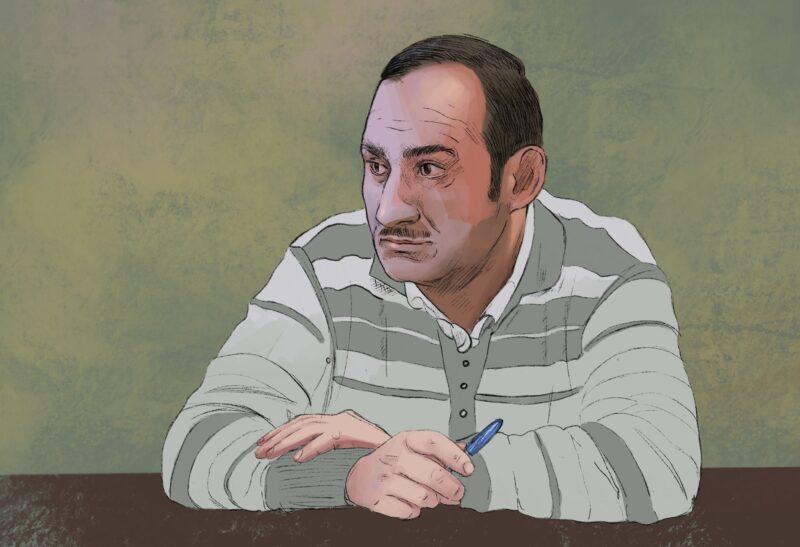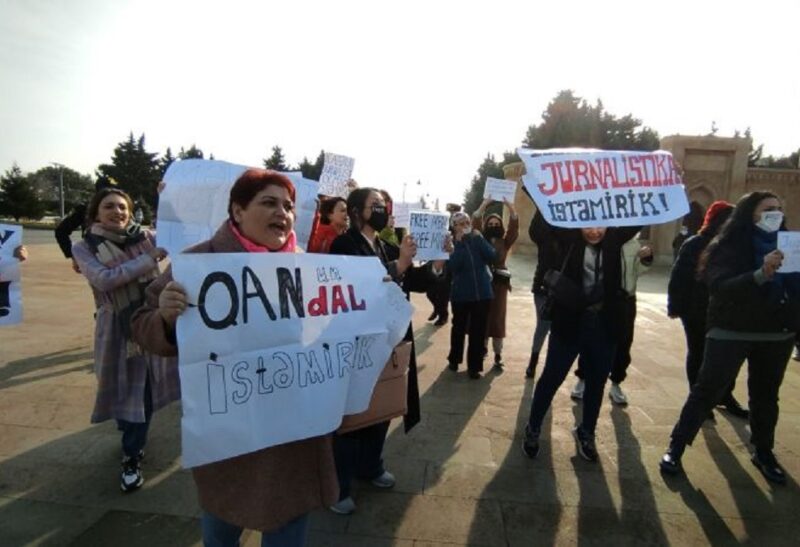

Mahmud came to Azerbaijan seeking political asylum. I don’t have the resources to check the accuracy of his account. I just want to bring attention to this story, to save a person who says that he is on the verge of death due to this terrible fate.
Mahmud Naji was born in 1982 in the Ardebil province of the Islamic Republic of Iran. Ethnically he is Azerbaijani. He gained a degree from Zəncan University, and used to work as a journalist, published in various newspapers, including “Keyhan”, “İran”, “Həmşəhri”, and “Asiman”. He is known as a supporter of reforms and a strong advocate for the rights of Iranian Azerbaijanis.
Mahmud Naji opposed death penalty and the “eye for an eye” principle of revenge on which it is based. He was active in an organization that brings together families of executed prisoners, joining protests and writing articles as an active supporter of Mirhuseyn Musavi, an opposition nominee for the 2008 presidential elections. Shortly afterwards, he was sentenced to ten years in jail as for allegedly instigating riots and posing a threat to national security. Naji has spent three years in the famous “Evin” prison of Tehran, and the rest in “Gohərdaş” prison of Kerej city. Even in prison he continued to campaign against capital punishment.
He managed to take a photo of an execution in Gohardash and smuggle it out to his colleagues. During the Novruz holiday in 2014, while he was out on the special fifteen-day exeat awarded to political prisoners and less-serious criminals, news broke that he had been the secret photographer at Gohardash. A new criminal case was opened against Naji on charges of “spreading state secrets”, punishable by death.
Mahmud Naji decided to flee Iran. On April 2
nd
he entered the territories of Jalilabad region in Azerbaijan, and encountered a border patrol at 9:40pm. And so Mahmud Naji was saved from the prospect of execution.
But the story didn’t turn out as he had hoped. His application of political asylum was rejected, and after Mahmud was handed over the police by the border patrol, he had no other recourse and his claims were never investigated. According to the July 11 2014 ruling by Jalilabad regional court, Mahmud Naji was sentenced to one year in jail. Judge Aliajdar Alakbarov stated: “Based on legal precedent stemming from May 13, 2014 on the evaluation of the case evidence, it is clear that even if Mahmud Naji is claiming that he illegally crossed the state border because he was pursued by official representatives of the Islamic Republic of Iran, his testimony has not been proved by the case materials. Moreover, even the proven existence of these circumstances does not entail a right to illegal border crossing.”
The judge failed to account for the “Note” part of Number 318 of the Criminal Code. In his opinion, the person chased by official representatives must cross the state border through a checkpoint, and ideally will present material proof that he is being pursued. Despite the judge’s argument, there is nothing in the materials of the case that indicated that Mahmud’s testimony is false or gives ground for suspicion. He crossed the border while the sun was shining brightly, and directly approached the border patrol. He did not try to hide or run when he was stopped. The border patrol has confirmed these facts in court. Anyone who wanted to cross the border for other reasons would not act as Naji did. Further, a decision on the veracity of Naji’s asylum application could not have been made by a police investigator without any experience in this sphere. Only a decision made by an organization working in field of migration could have constituted grounds for his final sentencing.
This case reveals some very strange things. A person seeks political asylum after crossing the border but is totally ignored; he is treated as a regular border trespasser; no one from a migration organizations visits him.
According to the precedent, after Mahmud Naji will serves his jail sentence, he will be removed from Azerbaijani territory by force. While it is not always explicitly stated in the court ruling, based on experience, foreigners are deported once they complete their time. Thus, Mahmud Naji, charged with dissemination of state secrets, potentially punishable by execution, characterized in Iran as a traitor, will be deported to his country.
Naji says that he sent a letter to the Azerbaijani President during the investigation but did receive an answer. He thinks that the letter did not reach the president. Although I have advised him to, he does not want to appeal to international humanitarian organizations like the International Red Cross. “I am trying to follow the processes happening in Azerbaijani Republic as much as possible. I remember when Ilham Aliyev was elected as president first time and what all the Azerbaijanis in the world said. I don’t want to go to Europe or the US. I want shelter in motherland, from my president. I believe that he will hear my voice and that he will not send me to be executed.”
In civilized countries, if a criminal is awaiting an execution in his own country he is not deported. It will be a disgrace for our country if someone who wanted shelter from Azerbaijan was sent to his death. In order to prevent this, the public and particularly Naji’s journalist colleagues must act to bring attention to his case.



